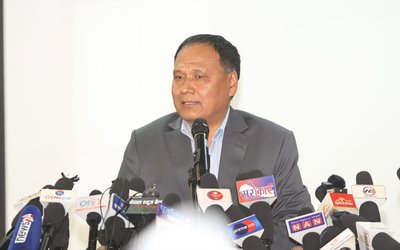
Although Nepal is in the process of concluding the peace process, there are still a lot of problems related to the process. Due to the failure in constituting the Disappearance and Truth and Reconciliation Commissions, the society is yet to reconcile with the past. The victims of the twelve-year conflict are yet to get justice.
In this broader context of the peace process, the book, which takes up to discuss building peace in Nepal, is very relevant. Peace is not possible without bringing all the actors of the conflict together. The gap, that exists in the society, needs to be bridged step by step.
The Comprehensive Peace Agreement, signed between then Maoist rebels and government, defines various institutional and operational aspects. The formation of the Disappearance Commission and Truth and Reconciliation Commissions are a major one. Similarly, the aim of CPA was to ease conflict, eradicate structural injustice of the society and to eliminate the future sources of conflict.
Despite making progress in several areas, Nepalese leaders failed to accomplish the major task of the peace process and to write the constitution through the Constituent Assembly. Although Nepal is heading towards the second elections of the CA, more uncertainties and points of disagreement prevail now than before. From the form of government to the structure of state and local bodies, political actors still need to make agreements before they write the constitution.
In fact, there are gaps in the core constitutional and political issues. "The deviation of the leadership from the course of peace building and efforts of aggrandizement of expulsive power reflected digression from the spirit of peace accord. Worse still, the ruling parties have taken over almost all independent institutions of the state, spoiling many positive opportunities available to citizens. It demonstrates the gap between commitment and accountability and the denouncement is: continuous deadlock over various constitutional issues. It has delayed the process of drafting constitution in time and transforming negative peace into positive peace as neither the Maoists nor the ruling parties are willing to work for the common good," writes Dev Raj Dahal, head of FES-Nepal, in his preface.
The book consists of five articles written by four prominent writers, analyzing the ways to achieve peace in the country. The article Building the Bridges of Peace in Nepal by Christian Wagner and Dev Raj Dahal discusses various stages of the peace process and failure of Nepal's leadership to achieve it.
Role of media is always important in the peace process as it helps to bring various forces of peace together giving space to express disenchantment. The paper written by Yubaraj Ghimire and Dev Raj Dahal discuss how mass media can play its role as a bridge builder of peace in Nepal.
The paper by C.D. Bhatta on Agent of Regime Change or peace builders discusses the role of various agents in transforming Nepalese society by changing social and political structure of the state. Bhatta argues that the frequent regime changes can be attributed to the inability of regime to address the minimum basic needs of the people and failure to adjust with the changing situations. Bhatta discusses Nepal's over sixty years long history of regime change and role of national power and outside power in this. "Since 1950s, no doubt, there has been 'outside involvement' for this and the degree of connection is also contested. Three major events of regime change have their own share of outside involvement," writes Bhatta.
Change has no meaning in case of failing to bring the governance on track. In his paper, ordering public goods in Nepal: Challenges of putting the governance track, Dahal discusses various institutions and legal frameworks.
"Building a productive relationship with the cultural industries such as media, civil society, public intellectuals, and intermediary institutions and movements can awaken the leaders to their accountability of drafting a social contract, structural reforms and sustainable peace through a broad rational consensus," writes Dahal, Head FES-Nepal, in the preface
- IME GROUP: Expands Into Paper Industry
- Mar 24, 2025
- CPN UML: Instigated By India
- Mar 23, 2025
- ADB’S CHIEF ECONOMIST: Nepal Reduces Poverty
- Mar 11, 2025
- FM DR. DEUBA: A Successful Visit
- Mar 11, 2025
- MD GHISING: Target Of Personal Grudge
- Mar 09, 2025















